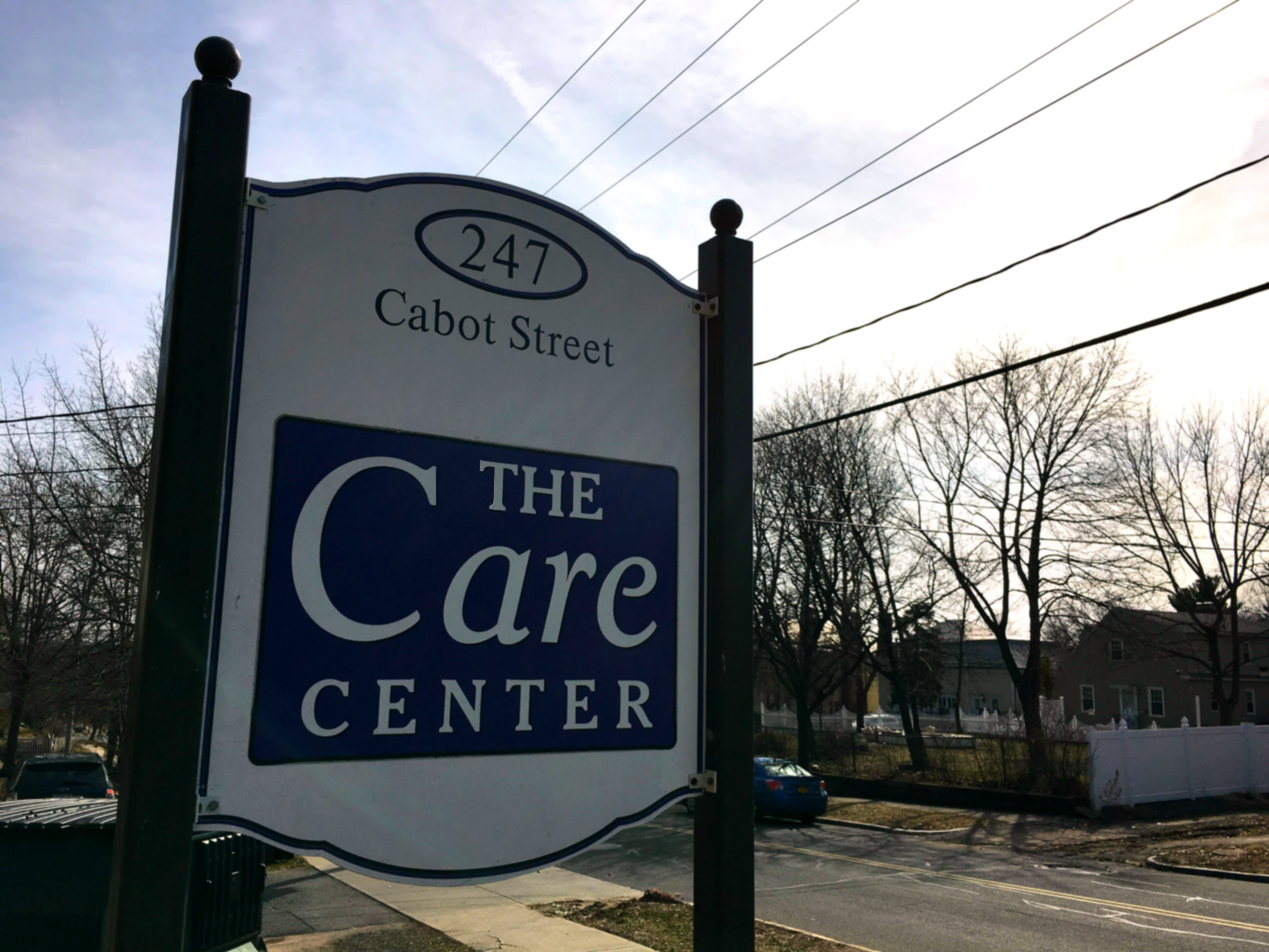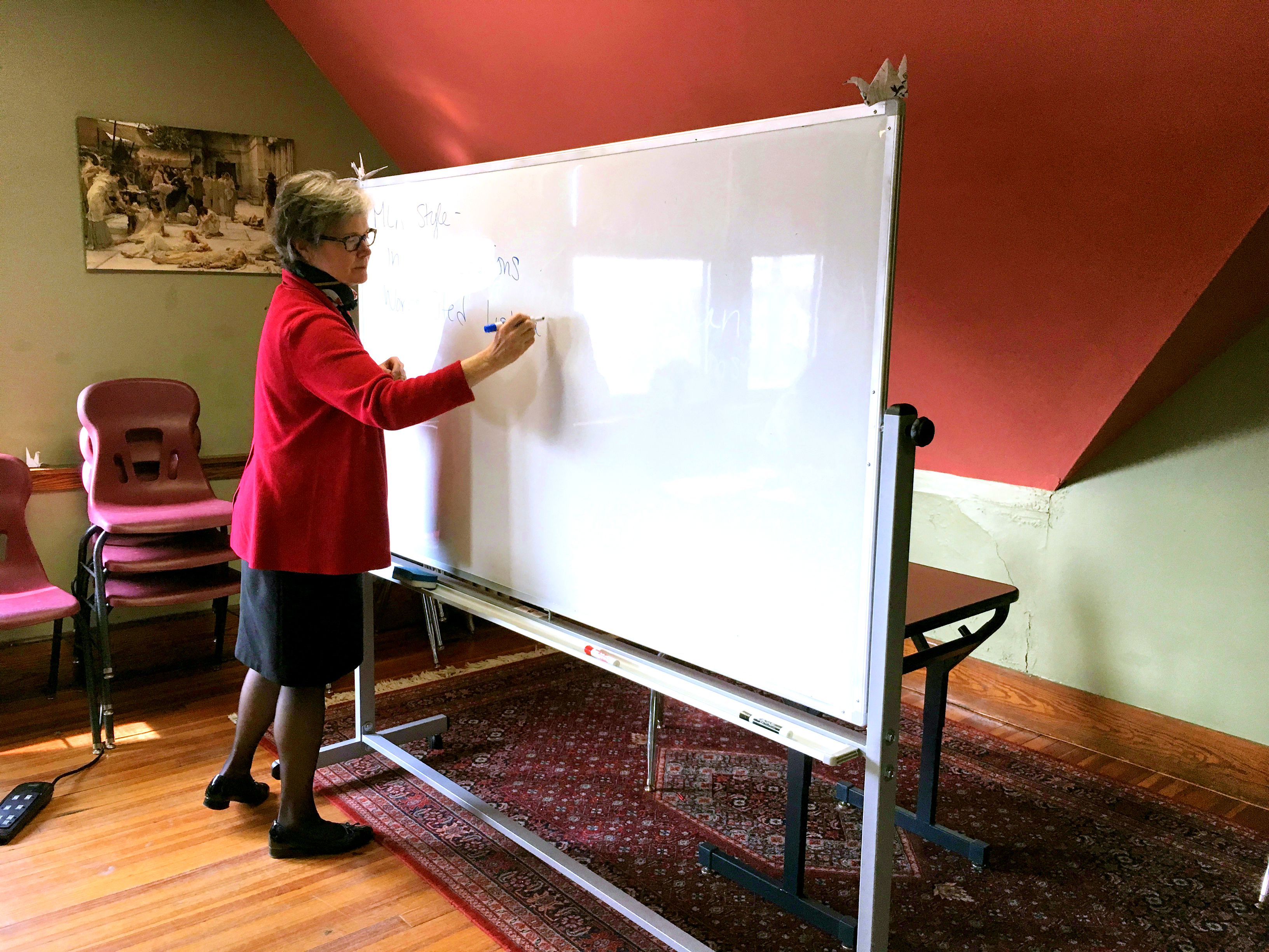
Angie Vera is one of 18 students pursuing a two-year Associate’s degree at Bard Microcollege Holyoke. After dropping off her one-year-old daughter at the school's daycare center, Vera uses the time before class to study. (Lydia Emmanouilidou/WGBH)
Bard College in New York and a nonprofit in Holyoke have partnered to launch what they say is the first of its kind microcollege, offering tuition-free education to low-income mothers and pregnant women.
The first thing 25-year-old Angie Vera does when she gets to the Bard Microcollege campus in Holyoke is drop off her one-year-old daughter at daycare. Then she’s off to class.
To get there, Vera doesn’t have to travel too far -- just a flight of stairs, passing through hallways lined with baby strollers and car seats.
This campus is really just one building, and Vera just one of 18 students -- that’s why it's called a microcollege.
Vera’s classes -- on subjects including statistics, history, and literature -- are taught through Bard College of New York, following the school's core curriculum. Next year, she’s on track to graduate with a two-year Associate's in Arts degree from the college.
For Vera, getting a college education has been filled with roadblocks. The Holyoke native dropped out of high school when she was 16, after getting pregnant with her first child. Eager to finish high school, she found herself at The Care Center, a Holyoke nonprofit that, for decades, has been helping low-income women in the community get their high school diplomas.
After passing the High School Equivalency Test, Vera enrolled at a local community college. But without the supports she had been receiving at The Care Center -- including childcare and transportation to campus -- she couldn’t focus on her studies.
“My professors would not accept that my son would have to come with me to class sometimes," Vera said. "It became extremely difficult just to sit in class and get the information I needed to do the work. And it meant failure for me."

At the Bard Microcollege in Holyoke, students say they get the support they need, including childcare, healthcare, and meals -- all under one roof. (Lydia Emmanouilidou/WGBH)
Like Angie, more than 75 percent of the women who got their high school equivalency through the Center went on to college. But according to Anne Teschner, The Care Center’s Executive Director, “very few” were graduating from college.
“This was not good," Teschner said. "So we thought: What if we just expanded the supportive bubble and added another level of education into the bubble?”
To do that, Teschner approached Bard, which, for decades, has been bringing its liberal arts curriculum to nontraditional students, including prisoners.
“We thought: If Bard has figured out how to transport an Associate's degree program to a prison, could they transport it here? And to our delight they said ‘Yes. We’d like to try that.’”
Like inmates, Bard officials say, pregnant women and young mothers are stigmatized, undervalued, and often expected to fail.
“We cannot sit back and expect great students that would take the best advantage of what we have to offer to come to us,” said Max Kenner, founder and Executive Director of the Bard Prison Initiative, which brings a liberal arts education to inmates at six prisons in New York. “We in higher education need to go and find these students and bring them an education in a context in which they can succeed.”
Related: Few Colleges Give Special Attention To Single Parents
The Holyoke community seemed like a natural fit for Bard’s outreach efforts. The city has a high poverty rate, a teen pregnancy rate nearly five times that of the state, and a high school dropout rate nearly triple the statewide rate.
The Bard Microcollege Holyoke opened its doors in August, 2016, accepting applications from young moms and pregnant women who had already gotten their high school diplomas through the center.
Admissions were rigorous. About a third of the women who applied got in.
“We have very high expectations, but we have very high support,” Teschner said. “Pretty much whatever you need to clear the deck and focus as a student, we provide. Books are free, laptops are free, daycare is free. It’s free.”
All costs, including tuition and fees, are covered through federal Pell Grants and private donations.
Teschner says these students - all of whom are on social services - need this kind of support to succeed. So far, the microcollege approach seems to be working: All of the women who enrolled in the fall are on track to graduate next year. Teschner says that's significant, considering many of these students previously tried college elsewhere but dropped out.
When they get their Associates in Arts, Teschner says these women will have the skills in reading, writing, and critical thinking to get jobs in leading industries in Western Massachusetts, including insurance, healthcare, and higher education.

Mary Anne Myers is the Program Director and a professor at the Bard Microcollege in Holyoke. (Lydia Emmanouilidou/ WGBH)
“Historically, that is not the kind of training that is offered to low-income people.” Teschner said. “There were lots of people saying [the education] should be more vocational. more skills-based. And we felt [that] this is the best kind of foundation we can provide for our students.”
It's too early to tell whether this approach will lead to job opportunities.
For now, students including Angie Vera are enjoying a chance at a liberal arts education -- an education, Vera says, she’s felt shut out of since getting pregnant.
“A lot of us have faced those circumstances where we’re suddenly being told that we’re no longer smart enough or good enough [after getting pregnant or having a kid], and that we need vocational training or just to go apply to McDonald's and stop trying to go to school,” Vera said.
When she gets through school, Vera hopes to get a job in healthcare in Holyoke. She says she's also looking into the possibility of going from "micro" Bard in Holyoke to "big" Bard in New York.
She's working hard, using all the little moments she gets during the day and wee hours of the night studying, reading, and writing -- hoping that sets a good example for her 7-year-old son.
“We both get up in the morning and pack up our book-bags and he goes off to the bus and the van for The Care Center comes and picks me up,” Vera said. “And on mornings where he’s like, ‘Mom I don’t wanna go to school’ and I’m like, ‘Me either, but we still have to go,’ we get up and go. And he sees [that] mom isn’t giving up, so [he] won’t either.”
Earlier: To Help Students Get To Class, Community College Partners With Uber










